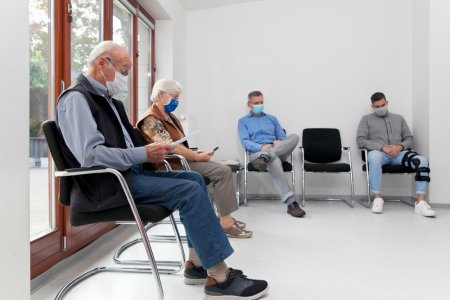‘Degrading and stressful’: Patient's two-hour hospital ordeal reveals healthcare system flaw
By
Seia Ibanez
- Replies 27
Adelaide is a city known for its liveability and strong community spirit.
But even the best cities aren't immune to the pressures that can weigh on a health system.
In an especially concerning instance that hit close to home for many of our readers, Michelle Hatt, a 52-year-old Adelaide local, experienced a harrowing ordeal that underscores the growing stress on our emergency medical services.
On 6 January, after becoming tired and losing consciousness, followed by the frightening loss of sensation in her arm, Hatt’s instincts likely told her that every second could mean the difference between life and death.
Paramedics, focusing on her symptoms, suspected a seizure.
Yet, on arrival at Lyell McEwin Hospital, Hatt found herself in a predicament.
She waited in the emergency department for two and a half gruelling hours as over 40 others queued for emergency assistance.
After her admission, Hatt reportedly saw a single nurse in eight hours.
Doctors later confirmed through magnetic resonance imaging (MRI) that Hatt suffered a stroke.
Hatt said the wait to see a medical staff was ‘degrading’ and stressful.
‘My feelings were I didn’t want to become disabled or lose my children because I passed (died) from not being diagnosed properly,’ she said.
‘You worry you’re going to leave your children behind, all because nobody is listening.’
‘You don’t get heard when you’re there. You’re just a number because there’s no staff.’
South Australia (SA) Health apologised to Hatt for her experience.
According to the department's guidelines, any patient waiting more than 30 minutes for transfer to the emergency department is classified as delayed or ramped.
SA Health reported that Hatt’s transfer to the emergency department was delayed by 66 minutes.
Initially, medical personnel failed to recognise that Hatt was experiencing a stroke. However, she underwent six sets of observations conducted by nursing staff "at regular intervals" throughout the night.
‘People who present to our ED are always prioritised according to their clinical need,’ SA Health said.
‘Patients are continually monitored from arrival, with those requiring the most urgent care always seen first.’
A Modbury Heights resident also shared the same fate as Hatt.
She was suffering from a painful leg ulcer, and her general practitioner (GP) referred her to a hospital for urgent treatment.
However, she spent ten hours in the Lyell McEwin Hospital Emergency Department without seeing a doctor.
In another incident, the family of Hectorville resident Eddie Fitchett, aged 54, attributed his death to a struggling health system.
On the day of Fitchett's passing last year, emergency services were contacted three times within a span of 10 hours due to his abdominal pain and vomiting.
However, a code white situation within the healthcare system resulted in emergency departments throughout the city being inundated, causing ambulance backups and preventing patients from being promptly admitted.
Shadow Opposition Leader David Speirs branded the current state of ramping as 'catastrophic.'
‘We know that 3759 hours were lost on the ramp in February,’ Speirs said.
‘Labour came to power (in 2022) saying we’ll fix this...and they’ve taken us off a cliff.’
In defence, Premier Peter Malinauskas points to improvements and vows of continuous investment.
Malinauskas stated that one factor exacerbating the issue of ramping at the Lyell McEwin Hospital is the scarcity of general practitioners (GPs) willing to bulk bill patients in Adelaide's northern suburbs.
‘The Lyell (McEwin) has seen an extraordinary number of cases you’d usually expect to see at a GP,’ he said.

What do you think of this story, members? Have you, or anyone you know, experienced the same in your local hospital? Let us know in the comments below.
But even the best cities aren't immune to the pressures that can weigh on a health system.
In an especially concerning instance that hit close to home for many of our readers, Michelle Hatt, a 52-year-old Adelaide local, experienced a harrowing ordeal that underscores the growing stress on our emergency medical services.
On 6 January, after becoming tired and losing consciousness, followed by the frightening loss of sensation in her arm, Hatt’s instincts likely told her that every second could mean the difference between life and death.
Paramedics, focusing on her symptoms, suspected a seizure.
Yet, on arrival at Lyell McEwin Hospital, Hatt found herself in a predicament.
She waited in the emergency department for two and a half gruelling hours as over 40 others queued for emergency assistance.
After her admission, Hatt reportedly saw a single nurse in eight hours.
Doctors later confirmed through magnetic resonance imaging (MRI) that Hatt suffered a stroke.
Hatt said the wait to see a medical staff was ‘degrading’ and stressful.
‘My feelings were I didn’t want to become disabled or lose my children because I passed (died) from not being diagnosed properly,’ she said.
‘You worry you’re going to leave your children behind, all because nobody is listening.’
‘You don’t get heard when you’re there. You’re just a number because there’s no staff.’
South Australia (SA) Health apologised to Hatt for her experience.
According to the department's guidelines, any patient waiting more than 30 minutes for transfer to the emergency department is classified as delayed or ramped.
SA Health reported that Hatt’s transfer to the emergency department was delayed by 66 minutes.
Initially, medical personnel failed to recognise that Hatt was experiencing a stroke. However, she underwent six sets of observations conducted by nursing staff "at regular intervals" throughout the night.
‘People who present to our ED are always prioritised according to their clinical need,’ SA Health said.
‘Patients are continually monitored from arrival, with those requiring the most urgent care always seen first.’
A Modbury Heights resident also shared the same fate as Hatt.
She was suffering from a painful leg ulcer, and her general practitioner (GP) referred her to a hospital for urgent treatment.
However, she spent ten hours in the Lyell McEwin Hospital Emergency Department without seeing a doctor.
In another incident, the family of Hectorville resident Eddie Fitchett, aged 54, attributed his death to a struggling health system.
On the day of Fitchett's passing last year, emergency services were contacted three times within a span of 10 hours due to his abdominal pain and vomiting.
However, a code white situation within the healthcare system resulted in emergency departments throughout the city being inundated, causing ambulance backups and preventing patients from being promptly admitted.
Shadow Opposition Leader David Speirs branded the current state of ramping as 'catastrophic.'
‘We know that 3759 hours were lost on the ramp in February,’ Speirs said.
‘Labour came to power (in 2022) saying we’ll fix this...and they’ve taken us off a cliff.’
In defence, Premier Peter Malinauskas points to improvements and vows of continuous investment.
Malinauskas stated that one factor exacerbating the issue of ramping at the Lyell McEwin Hospital is the scarcity of general practitioners (GPs) willing to bulk bill patients in Adelaide's northern suburbs.
‘The Lyell (McEwin) has seen an extraordinary number of cases you’d usually expect to see at a GP,’ he said.
Key Takeaways
- Michelle Hatt experienced a stroke and had to wait outside the Lyell McEwin Hospital emergency department for over two hours, feeling 'degraded' due to the lack of attention from staff.
- Despite suffering a serious condition, Hatt said she did not receive prompt medical attention partly due to overcrowding in the emergency department and staffing issues.
- SA Health apologised for Hatt's experience, stating that on 6 January, the hospital faced high demand, and her transfer to emergency was considered delayed by 66 minutes.
- The issue of ambulance ramping and hospital waits has been highlighted as a significant problem in the South Australian health system, with the Premier acknowledging the need for further improvements despite some recent progress.









